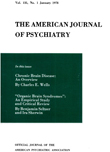PROGNOSIS IN "PROCESS" AND "NON-PROCESS" SCHIZOPHRENIA
Abstract
The relative success in dividing a group of patients into subgroups with varying outcomes depends in part, of course, on the nature of the original group and the criteria by which the diagnosis of schizophrenia was first made. In the group we have studied it was found that the risk of deterioration was very light in the "non-process" patients whereas the prognosis was grave in the "process" group. Nevertheless, although about half of the "process" patients were badly deteriorated on follow-up, we were unable to predict which particular "process" patients would either improve or worsen after discharge. Thus fatalistic pessimism about a particular schizophrenic patient is unwarranted.
We cannot say on the basis of our study whether we are dealing with discrete kinds of disease processes or different points on a continuum. However, our findings do support, for practical purposes, Bleuler's concept of "groups of schizophrenias" rather than an entity "schizophrenia"(7). Our findings are thus in agreement with those of Freyhan(18) who has urged that we re-examine Bleuler's concepts which are no less pertinent today than 40 years ago.
The persisting notion of "schizophrenia" as an entity can only impede understanding and research. European phenomenological studies, unfortunately little known in this country, may provide some clarification in this confusing field.
Access content
To read the fulltext, please use one of the options below to sign in or purchase access.- Personal login
- Institutional Login
- Sign in via OpenAthens
- Register for access
-
Please login/register if you wish to pair your device and check access availability.
Not a subscriber?
PsychiatryOnline subscription options offer access to the DSM-5 library, books, journals, CME, and patient resources. This all-in-one virtual library provides psychiatrists and mental health professionals with key resources for diagnosis, treatment, research, and professional development.
Need more help? PsychiatryOnline Customer Service may be reached by emailing [email protected] or by calling 800-368-5777 (in the U.S.) or 703-907-7322 (outside the U.S.).



